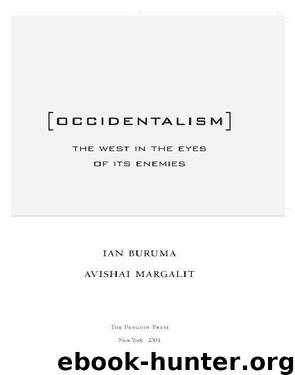Occidentalism by Ian Buruma

Author:Ian Buruma
Language: eng
Format: epub, mobi
Publisher: Penguin USA, Inc.
“WHAT IS TRULY OURS IS STRANGE TO EUROPE,” DOSTOYEVSKY declared. This is patently untrue. Much of what the Russians considered to be “ours” was not strange to Europe at all, but actually came from there.
Like vodka, which came to Russia from the West in the fourteenth century, just about when the Turks defeated the Serbs in Kosovo, nineteenth-century Occidentalism, though to a large extent imported from Germany, became strongly associated with Russia. Of course, the question of precisely what comes from the West and what is of genuine Slavic origin is an argument without end. Even the name Rus, some say, came from a Scandinavian source. German historians believed that Russians, left to their own devices, were so anarchic that they would have needed the Scandinavian Varangians to impose some order on them. The ruling structure of the old Russian kingdom in Kiev, these historians claim, was such an imposition. This German tendency is the opposite of the farcical effort of the Stalinist regime to claim that all technological inventions were of Russian origin, but no less absurd. Russians are perfectly capable of developing their own ideas. And it is nonsense to try to find a Western pedigree for every idea that gained currency in Russia. Occidentalism in Russia is both a domestic product of Russian history and imported, mainly from the Romantic and idealistic strains of German philosophy.
One of the most significant events in Russian history is the conversion to Christianity of the kingdom of Kiev at the time of Vladimir. Refusing to adopt Roman Catholicism, Vladimir converted to the Greek Orthodox version of Christianity in 988. This put Russia firmly on the Eastern side of Christendom. When the center of Russian life moved from Kiev to Moscow, and the kingdom of Muscovy became the leading center of the Russian principalities in the fourteenth century, the head of the Orthodox church moved to Moscow too. As a result, Moscow became the spiritual center of Russia, and not merely the seat of power. In 1439, at the Council of Florence, the Roman Catholic Church called for the unification of all Eastern churches under papal rule. This was viewed in Moscow as a perfidious act, and so the Russian church became a strongly national church, fated to carry the authentic message of Christianity. Russia became the “holy Rus,” and Moscow the “third Rome.” The conquest of Constantinople by the Ottomans in 1453 cemented this messianic view, according to which Russia is the only legitimate heir to the true Christian faith.
The Muscovy kingdom was in many respects closer to a religious civilization than to a political order. There was a great deal of uniformity in the general outlook of this civilization, and Russians tended to view the West as monolithically as they viewed themselves. But they underestimated the variety of religious thought in the West. There was, for example, less room for theology in the Russian Orthodox Church. Russians were mostly concerned with ritual, liturgy, and the monastic life. Simple piety more
Download
This site does not store any files on its server. We only index and link to content provided by other sites. Please contact the content providers to delete copyright contents if any and email us, we'll remove relevant links or contents immediately.
| Civilization & Culture | Expeditions & Discoveries |
| Jewish | Maritime History & Piracy |
| Religious | Slavery & Emancipation |
| Women in History |
Cecilia; Or, Memoirs of an Heiress — Volume 1 by Fanny Burney(32538)
Cecilia; Or, Memoirs of an Heiress — Volume 2 by Fanny Burney(31934)
Cecilia; Or, Memoirs of an Heiress — Volume 3 by Fanny Burney(31925)
The Secret History by Donna Tartt(19025)
Sapiens: A Brief History of Humankind by Yuval Noah Harari(14358)
Leonardo da Vinci by Walter Isaacson(13305)
The Radium Girls by Kate Moore(12012)
Sapiens by Yuval Noah Harari(5363)
How Democracies Die by Steven Levitsky & Daniel Ziblatt(5210)
The Wind in My Hair by Masih Alinejad(5085)
Homo Deus: A Brief History of Tomorrow by Yuval Noah Harari(4897)
Endurance: Shackleton's Incredible Voyage by Alfred Lansing(4750)
Man's Search for Meaning by Viktor Frankl(4569)
The Silk Roads by Peter Frankopan(4522)
Millionaire: The Philanderer, Gambler, and Duelist Who Invented Modern Finance by Janet Gleeson(4457)
The Rape of Nanking by Iris Chang(4197)
Joan of Arc by Mary Gordon(4092)
The Motorcycle Diaries by Ernesto Che Guevara(4082)
Stalin by Stephen Kotkin(3955)
